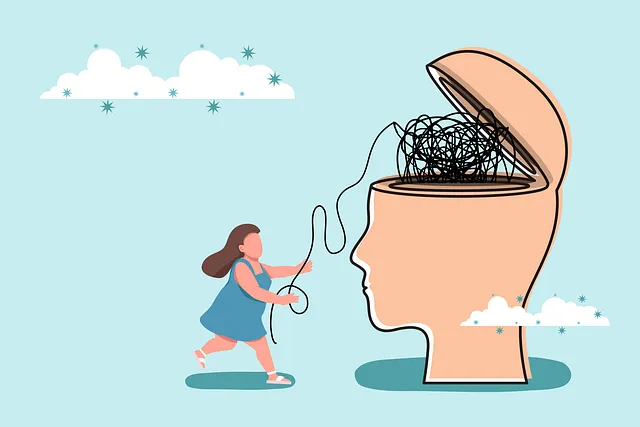In diverse Colorado Springs, Kaiser provides culturally sensitive mental health services, addressing barriers through training, compassion cultivation, and public awareness campaigns. Their approach ensures safe, respectful environments for all backgrounds, promoting open communication and improved outcomes. By integrating cultural competence, Kaiser meets unique needs, empowering individuals to navigate emotional journeys with enhanced coping mechanisms and improved well-being.
“Cultural sensitivity in mental healthcare is an essential aspect of providing effective treatment, especially in diverse communities like Colorado Springs. This article explores the significance of cultural competence and its impact on patient outcomes. We delve into the specific challenges faced by mental health professionals in offering culturally sensitive care, particularly within Kaiser’s services in Colorado Springs.
By examining these issues, we uncover practical strategies to enhance cultural sensitivity in practice, ensuring equitable access to quality mental healthcare for all.”
- Understanding Cultural Sensitivity in Mental Healthcare
- The Importance of Cultural Competence in Colorado Springs
- Kaiser's Mental Health Services: An Overview
- Challenges in Providing Culturally Sensitive Care
- Strategies for Incorporating Cultural Sensitivity in Practice
Understanding Cultural Sensitivity in Mental Healthcare

Cultural sensitivity is a cornerstone of effective mental healthcare practice, especially in diverse communities like Colorado Springs where Kaiser offers comprehensive mental health services. It involves recognizing and appreciating the unique cultural backgrounds, values, and beliefs of individuals seeking help. Mental health professionals must understand that cultural context significantly influences how people express emotions, perceive health and illness, and respond to treatment. By incorporating cultural sensitivity, healthcare providers can create a safe and supportive environment, fostering trust and encouraging open communication.
This approach goes beyond language translation services. It includes training in social skills and compassion cultivation practices tailored to diverse populations. For instance, Public Awareness Campaigns Development can play a vital role in educating communities about mental health, breaking down cultural barriers, and promoting understanding. Through these initiatives, healthcare systems like Kaiser in Colorado Springs strive to ensure that all individuals receive respectful, culturally competent care, ultimately improving outcomes and enhancing overall well-being.
The Importance of Cultural Competence in Colorado Springs

In Colorado Springs, the importance of cultural competence cannot be overstated, especially when considering the diverse population that calls this vibrant city home. Mental healthcare providers play a crucial role in fostering equitable access to services for all residents. Kaiser, known for its comprehensive mental health services, has recognized this need and incorporated cultural sensitivity into its practice. By doing so, it ensures that the emotional intelligence of its staff aligns with the mental health policy analysis and advocacy efforts, ultimately enhancing the awareness and understanding of diverse communities’ unique needs.
This commitment to cultural competence is essential in addressing potential disparities in mental healthcare. The city’s diverse landscape demands tailored approaches, ensuring that services are accessible, respectful, and relevant to various cultural backgrounds. When mental health professionals demonstrate an appreciation for these differences, they can create a safe and supportive environment, leading to improved outcomes for all clients, including those who may be hesitant to seek help due to cultural barriers.
Kaiser's Mental Health Services: An Overview

Kaiser, a prominent healthcare provider in Colorado Springs and beyond, offers a comprehensive suite of mental health services designed to cater to diverse cultural needs. Their approach is rooted in providing accessible care that respects individual backgrounds and beliefs. The organization recognizes the importance of cultural sensitivity in mental healthcare, ensuring that their practices promote emotional regulation and foster strong therapeutic alliances.
Kaiser’s mental health professionals are trained in compassion cultivation practices, aiming to create a safe space for clients from all walks of life. They offer tailored interventions focusing on resilience building, addressing various challenges, including trauma, stress, and mood disorders. Through these services, Kaiser strives to empower individuals, helping them navigate their emotional journeys with enhanced coping mechanisms and improved overall well-being.
Challenges in Providing Culturally Sensitive Care

Providing culturally sensitive care in mental healthcare is a complex task, especially in diverse communities like Colorado Springs, where Kaiser offers mental health services. One of the primary challenges lies in understanding and respecting different cultural beliefs and practices that may influence an individual’s approach to seeking help. Patients from various ethnic and socioeconomic backgrounds may have unique perspectives on mental illness, healing, and the expression of emotions, which can significantly impact their treatment preferences and expectations.
For example, some cultures emphasize community support and traditional healing methods, while others prioritize individual therapy and Western psychiatric interventions. Mental health professionals must be adept at navigating these differences to avoid potential conflicts or misunderstandings. Additionally, language barriers and cultural misconceptions can contribute to burnout prevention challenges among healthcare providers, hindering their ability to offer quality care. Effective communication, cultural competence training, and the adoption of emotional well-being promotion techniques are essential tools to overcome these obstacles, fostering an environment where patients feel heard, respected, and supported in developing coping skills.
Strategies for Incorporating Cultural Sensitivity in Practice

Incorporating cultural sensitivity into mental healthcare practice involves a multifaceted approach that begins with self-awareness exercises. Healthcare providers in diverse settings, including those offered by Kaiser in Colorado Springs, must educate themselves on various cultural norms, beliefs, and practices to better understand their clients’ backgrounds. This knowledge enables them to create safe, inclusive spaces where individuals from different ethnicities, religions, and socio-economic statuses feel heard and respected.
One effective strategy is the integration of compassion cultivation practices, which encourage empathy and understanding. Encouraging open dialogues about cultural differences and similarities can foster a supportive environment. Additionally, organizations like Kaiser can support mental health professionals by producing a Mental Wellness Podcast Series that addresses cultural sensitivity topics. These resources not only enhance practitioners’ self-awareness but also equip them with tools to navigate the complex landscape of cultural differences in mental healthcare effectively.
Cultural sensitivity in mental healthcare is essential, especially in diverse communities like Colorado Springs. As demonstrated by Kaiser’s comprehensive mental health services in this region, integrating cultural competence enhances patient outcomes and overall well-being. However, challenges remain, including understanding complex cultural nuances and overcoming systemic barriers. By adopting strategies such as enhanced training, tailored therapeutic approaches, and community engagement, mental healthcare practitioners can provide more inclusive and effective care. For individuals seeking support in Colorado Springs, knowing that Kaiser offers culturally sensitive mental health services is a significant step towards finding the right care for their unique needs.






